During her glory days a decade ago, Aravane Rezai was considered one of the most dangerous, most beautiful and most interesting WTA players. However, the former world No.15 has been far from the spotlight for too long as her tennis results declined. What is the Frenchwoman up to? Is she reviving her career?
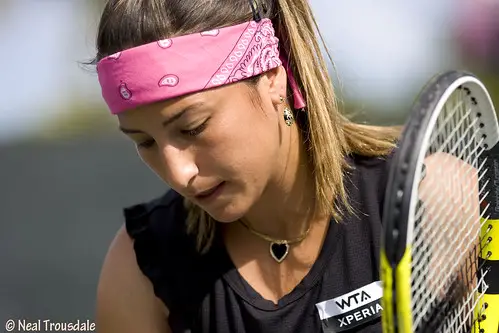
Rezai’s résumé includes victories over big names such as Justine Henin, Venus Williams, Victoria Azarenka, Maria Sharapova, Dinara Safina, Francesca Schiavone, Caroline Wozniacki, Marion Bartoli, Flavia Pennetta, and Jelena Jankovic.
The French player of Iranian descent has won four WTA titles: Strasbourg and Bali in 2009 and Madrid and Bastad in 2010. Her best Grand Slam showings are fourth-round finishes at Roland Garros and the US Open.
After ending the 2010 season ranked No.19, Rezai fell out of the Top 100 the following year. As time went by, her ranking only got worse. From a player in the spotlight during her peak, the Frenchwoman has almost disappeared from international media.
Her last win over a Top 100 player happened at the Madrid Open in May 2013, when she defeated world No.82 Anna Tatishvili in qualifying. Her last main-draw appearance at a Grand Slam was at the 2013 French Open.
Now 34 years old and ranked No.1249 in singles, Rezai is playing on the ITF circuit. She participated in the recent $80,000 Le Neubourg event in France, where she managed to qualify, but lost in the first round. “I think I am the oldest player at the tournament,” Rezai remarked.
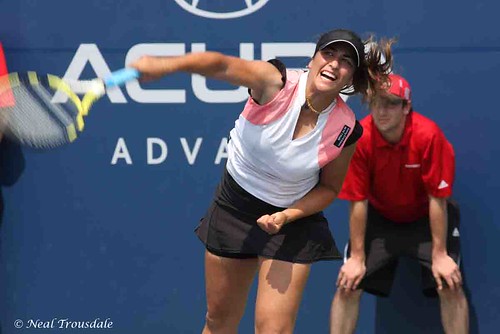
Rezai had major family issues, most notably with her father, Araslan Rezai. They became estranged in 2012. The problems started being evident to general public in February 2011, when her father was banned to follow her at all WTA tournaments.
According to Tennis Majors, Aravane has reconnected with her family both on a personal and professional level. Her father again serves as her coach.
If, in 2019, I had been told that a year later, I was going to reconnect with my family and train with my father, for me, it would be impossible, but I needed to find my family, to see my father, my sister, my mother… I took the first step, I found a peaceful and calm father. Little by little we got back on the ground.
Araslan said that he had to become less authoritarian to be able to improve the relationship with his daughter, and it’s something that he still struggles with:
It’s not the same relationship. Before, I was a father like in the army. If I told her “you jump from the second floor”, she would jump. Today it is not the same Aravane. She decides when to go to work. For me it’s difficult but we adapt.
The older generation of players is doing great on the WTA Tour. Let’s hope that Rezai will once again experience at least a portion of stardom from her glory days.
Random info: In this week’s Q&A on her Instagram, Rezai revealed that she is single. (photos: ©Neal Trousdale)



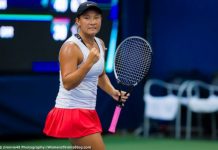
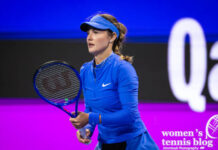

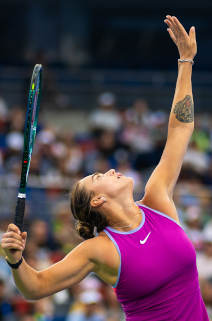

I saw her play live against Serena Williams in Sydney. I think Williams won in the end, but Rezai was giving her a good run for her money. She had quite an unusual outfit too as I recall, and an impressive court presence. I thought at the time she would end up in the top 10. Sounds like yet another case of toxic father wrecking things. Why does this happen so often?
CLT, the only thing I in the end excluded to mention are her outfits. She had several extraordinary designs and I wrote about them at the time. https://womenstennisblog.com/2010/12/09/aravane-rezais-shocking-scheyda-style-in-2010/ She was a really interesting player, in every respect.
What’s interesting about her father is that he admits being super controlling. In the quote I shared he says that Aravane has much more freedom to make decisions for herself now, but he finds it difficult to adapt to that. My guess is that such parent-child relationships happen in tennis because a lot is at stake. From my perspective, players need to decide very early whether they want to become professional, then their parents have to sacrifice a lot to make it happen, and there’s no turning back. Of course, the other factor is simply the parent’s personality.
Her history is so sad and kind of scary because of her relations with her father. Kind of warning for other, especially, younger players. Just hope that she’s enjoying tennis now and fingers crossed about her future.
Mateusz, imagine, if injuries are not slowing you down, your family is. Top players need to overcome so many obstacles to reach the top and stay there. I think we often forget that.
I think you’re right in that the parents have to invest a lot to help the child/adolescent’s career, unless the family is very well off, and then some of them find it very hard to let go. It’s understandable, but it causes so many problems. Here in Australia, Jelena Dokic is now doing tv commentary (and she is very good at it), but I saw her nearly in tears just recently talking about how important it is to have a family that is sane and supportive, but not obsessive, like Ashleigh Barty has. As you may recall Jelena’s father was abusive to her and basically ruined her career.
CLT, Dokic’s story is also heartbreaking. She released autobiography “Unbreakable” a few years ago. She had severe depression and almost lost her life to it. She had also gained a lot of weight as a consequence of her bad mental state. She seems to be doing much better now.
Aravane had also gained a lot of weight and slimmed down later.
She was a spectacular player for awhile and her gold/black outfits suited her well. Too bad her father it sounds like messed up her career. She really was a great talent and exciting to watch.